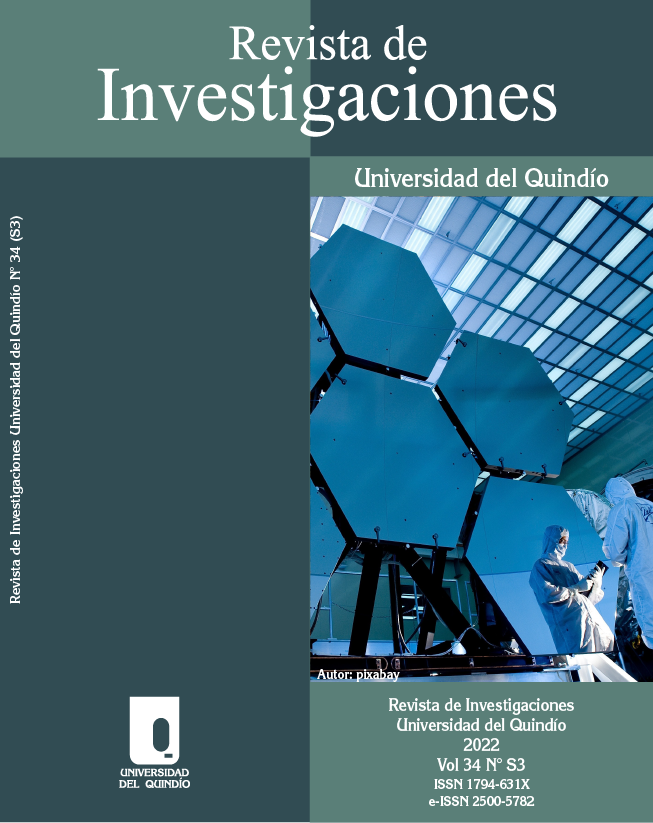Modelo de desarrollo de potencial axiologico y su implementacion en el entorno educativo digital de una universidad técnica
DOI:
https://doi.org/10.33975/riuq.vol34nS3.1001Palabras clave:
potencial axiológico, modelo de desarrollo, estudiante universitario técnico, entorno educativo digitalResumen
En la actualidad, parece necesario estudiar el potencial axiológico de los estudiantes en el entorno educativo digital de una universidad técnica. Este estudio, realizado a partir de los sitios experimentales de la Institución Educativa de Educación Superior Presupuestaria del Estado Federal, ofrece el modelo para el desarrollo potencial axiológico de los estudiantes y su implementación en el entorno educativo digital de una universidad técnica. El potencial axiológico de los estudiantes universitarios técnicos se manifiesta en la actitud valorativa hacia las actividades docentes e investigativas, la conciencia de las necesidades y oportunidades, en el desarrollo de habilidades al nivel de la actividad productiva, en la puesta en práctica de las habilidades y la autorrealización. El artículo analiza el modelo de desarrollo del potencial axiológico estudiantil en el entorno educativo digital de una universidad técnica, presta atención a los enfoques metodológicos, un conjunto de condiciones pedagógicas para el desarrollo y el contenido a nivel estructural de los componentes del potencial axiológico entre los estudiantes de una universidad técnica.
Descargas
Citas
Aladyshkin, I. V., Kulik, S. V., Odinokaya, M. A., Safonova, A. S., & Kalmykova, S. V. (2020, March). Development of electronic information and educational environment of the university 4.0 and prospects of integration of engineering education and humanities. In Proceedings of the Conference “Integrating Engineering Education and Humanities for Global Intercultural Perspectives” (pp. 659-671). Springer, Cham.
Bulankina, N., Umbrashko, К., Nan, L., & Yumen, S. (2019). Axiological component of professional readiness of a modern teacher to work in the aspect of the cross-border region. In SHS Web of Conferences (Vol. 70, p. 02002). EDP Sciences.
Ereshchenko, M. V., Zubareva, E. G., & Zubareva, S. S. (2019). Multimodal training as the strategy of human resources development in conditions for digital transformation. In SHS Web of Conferences (Vol. 70, p. 03003). EDP Sciences.
Gulyaeva, E., & Semikina, Y. G. (2020). Project activity as a means of multicultural values development in the internet-mediated learning environment. ARPHA Proceedings, 3, 771.
Grishaeva, Y., Gagarin, A., Spirin, I., Matantseva, O., Mitrofanova, T., & Vishnevskaya, K. (2021, June). Designing Eco-cultural Development of Students' Personality in the Digital Educational Environment. In 2021 1st International Conference on Technology Enhanced Learning in Higher Education (TELE) (pp. 268-273). IEEE.
Ilinskaya, I. P. (2020). Primary school student’s spiritual and moral education and digitalization of education: the search for consensus. ARPHA Proceedings, 3, 827.
Klochko, O., Fedorets, V., Maliar, O., & Hnatuyk, V. (2020). The use of digital models of hemodynamics for the development of the 21st century skills as a components of healthcare competence of the physical education teacher. In E3S Web of Conferences (Vol. 166, p. 10033). EDP Sciences.
Kubrushko, P. F., Alipichev, A. Y., Kozlenkova, E. N., Nazarova, L. I., & Siman, A. S. (2020, November). Digital competence as the basis of a lecturer’s readiness for innovative pedagogical activity. In Journal of Physics: Conference Series (Vol. 1691, No. 1, p. 012116). IOP Publishing.
Ovcharuk, V., Maksymchuk, B., Ovcharuk, V., Khomenko, O., Khomenko, S., Yevtushenko, Y., ... & Maksymchuk, I. (2021). Forming Competency in Health Promotion in Technical Specialists Using Physical Education. Revista Romaneasca Pentru Educatie Multidimensionala, 13(3), 01-19.
Razinkina, E., Pankova, L., Trostinskaya, I., Pozdeeva, E., Evseeva, L., & Tanova, A. (2019). Influence of the educational environment on students’ managerial competence. In E3S Web of Conferences (Vol. 110, p. 02097). EDP Sciences.
Salakhova, V. B., Masalimova, A. R., Belyakova, N. V., Morozova, N. S., Osipova, N. V., & Prokopyev, A. I. (2021). Competitive Teacher for Higher Education: Risk-Based Models of Its Development. Eurasia Journal of Mathematics, Science and Technology Education, 17(10).
Sazonova, T., Khristodulo, O., Kiryakova, A., & Dusheyeva, N. (2022). Axiological approach in the university’s transformation based on the use of digital and remote educational technologies in pandemic and normal conditions. In SHS Web of Conferences (Vol. 137, p. 01021). EDP Sciences.
Shipunova, O., Evseeva, L., Pozdeeva, E., Evseev, V. V., & Zhabenko, I. (2019). Social and educational environment modeling in future vision: infosphere tools. In E3S Web of Conferences (Vol. 110, p. 02011). EDP Sciences.
Tolnaiová, S. G. (2020). Transformation of education and training system in the context of digital information and communication technology in sociocultural perspective and its axiological and ethical dimension. European Journal of Tranformation Studies, 8(2), 89-105.
Vladimirovich, K. O., Viktorovich, G. V., Igorievich, P. O., Victorovna, S. Z., & Akopovna, K. N. (2021). Formation of ethical and axiological competencies when using ICT in education. International Journal of Applied Exercise Physiology, 10(1), 129-134.
Descargas
Publicado
Cómo citar
Número
Sección
Licencia
Derechos de autor 2022 Revista de Investigaciones Universidad del Quindío

Esta obra está bajo una licencia internacional Creative Commons Atribución-NoComercial-SinDerivadas 4.0.


